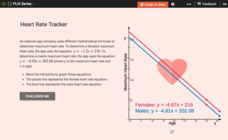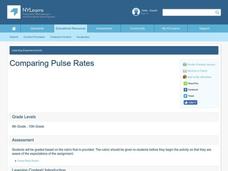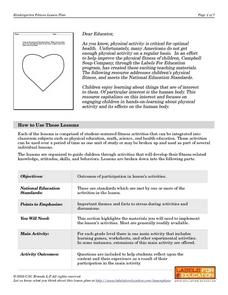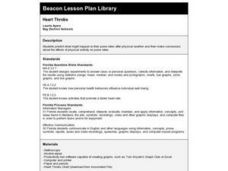PLS 3rd Learning
Interpreting Heart Rates During Various Physical Activities
Learners review terminology: pulse, heart rate, target heart rate zone. They work in three groups, and assigned to one of three activity stations. At 5-minute intervals, 4th graders check their pulse and record it on their group...
Curated OER
Exercise and the Human Heart
Interpret data and learn about the human heart in one activity! After learning about the way blood flows in the body, fifth graders answer two questions about a graph displaying pulse rate. They then take their own pulses to find the...
CK-12 Foundation
Graphs of Linear Systems: Heart Rate Tracker
Max out heart rates for males and females. Formulas of maximum heart rates provide the equations for a linear system. Pupils use the interactive to graph the equations for males and females and determine their points of intersection. The...
Curated OER
Human Body Series - Cardiovascular System
Pump up your class while studying the cardiovascular system with this pair of activities. In one, learners record heart rates during different actions. In the second, they read kid-friendly heart health articles online and then write a...
Curated OER
Regulation of Human Heart Rate
In this regulation of the human heart rate worksheet, students learn to measure their heart rate and design an experiment to test for the affects of a stimulus on the heart rate.
Curated OER
Temperature Affects The Heart Rate
High schoolers relate heart rate and development to environmental conditions through experiment. In cooperative groups, students record the heart rate in developing zebra fish. Groups create a standard curve to predict the temperature...
Museum of Science
Virtual Heart
No more beating the pavement to find a virtual model of the human heart. See one in continual real-time motion, and layer it to highlight electrical impulses, blood flow, and valve activity.
Mascil Project
Sports Physiology and Statistics
If I want to build up my heart, where should I start? Science scholars use statistics in a sports physiology setting during an insightful experiment. Groups measure resting and active heart rates and develop a scatter plot that shows the...
Curated OER
Interactive Heart Rate Worksheet
Students perform various cardiovascular activities, then complete a worksheet that records their target heart rate.
Curated OER
Crazy Frog Dance
Teach your young learners some basic line dance steps. Get them moving to increase their heart rates and to have fun. This dance consists of a few steps and there is a part that is for free-style moves. While the written description is...
American Physiological Society
Drug the Water Flea
This is a flea. This is a flea on drugs. Any questions? Your class will have questions aplenty during an impactful experiment. Lab groups get to know Daphnia magna, the humble water flea, and study the effects of stimulants and...
Curated OER
How Does our Heart Rate Change?
Students feel their pulse and describe it. They predict whether certain activities will increase or decrease their heart rates. Students use a heart rate sensor to determine resting heart rates and those after activity. In conclusion,...
Curated OER
Comparing Pulse Rates
Learners participate in a lab that demonstrate one example of how the human body maintains homeostasis. Students collect data from themselves and observe how their own bodies react to exercise.
Curated OER
Your Beating Heart - Circulatory System
Learners illustrate a schematic circulatory system of a human body including heart, lungs, arteries, veins and capillaries. Next, students conduct an experiment to increase understanding of the relationship between heart rate/pulse and...
Curated OER
A Child's Journey through Medicine
Students experience a variety of activities that relate to human physiology and their functions. They create graphs and charts after testing their heart rates and blood pressure They conduct a survey of the student body and create ...
Curated OER
The Effects of Temperature Variations on the Heartbeat Rate of Daphnia
Students use DigiScope technology to investigate Daphinia, popularly known as water fleas. They design, conduct, and report on an experiment to determine the effects of varying water temperatures on the heartbeat rate of Daphnia.
Curated OER
Healthy Heart
Students examine the functions of the heart and ways to maintain a healthy heart. In this human body science lesson, students listen to Magic School Bus Inside the Human Heart, and diagram the human heart and blood flow. ...
Curated OER
My Response to Stress
Students search for ways to prevent stress. They conduct self-assessments, plan a stress clinic, research community resources, and write a reflective essay. Students may wear electronic heart rate monitors to demonstrate stress levels.
Curated OER
Change the Beat
Brainstorm the reasons why a healthy heart is important. Using a diagram, label and locate the heart and discuss its function. Practice finding your heartbeat and describe the effects of physical activity on the heart. Also perform an...
Curated OER
Fitness Lab
Students complete several physical fitness stations. Students identify which activities increased their heart rates from a resting level. Stations include jumping jacks, sit-ups, running in place, stretching, and body fat measurements.
Curated OER
Exercise and Heartrate
Fourth graders experiment to find the effects of exercise on the heart rate. In this exercise and heart rate lesson, 4th graders create questions about exercise and heart rate. Students use the scientific method to test and analyze...
Statistics Education Web
Consuming Cola
Caffeine affects your heart rate — or does it? Learners study experimental design while conducting their own experiment. They collect heart rate data after drinking a caffeinated beverage, create a box plot, and draw conclusions....
Curated OER
All About Blood and the Heart (Human Body for Children)
In this anatomy activity, students learn about the heart and it's characteristics. Students monitor their heartbeat in an experiment and then answer a series of questions about what they found.
Curated OER
HEART THROBS
Students predict what might happen to their pulse rates after physical exertion and then make conclusions about the effects of physical activity on pulse rates.

























